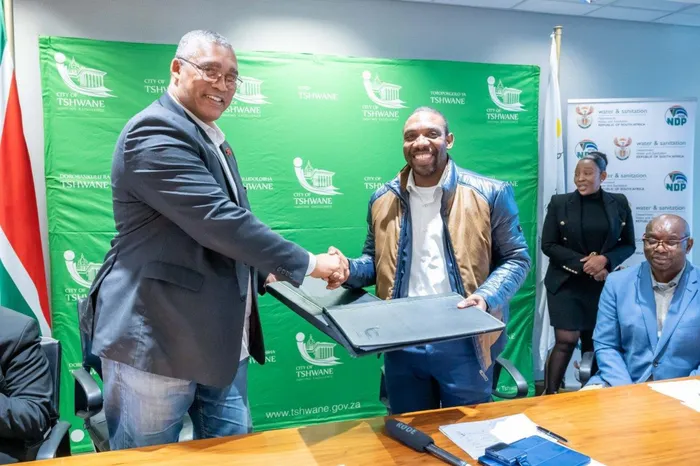New pact to address City’s water constraints signed

Tshwane municipal manager Johann Metter and deputy director-general for water and sanitation services Dr Risimati Mathye shake hands after signing of MoU. SUPPLIED
The City of Tshwane is set to overcome long-standing water challenges through a new agreement with the Department of Water and Sanitation.
During the signing of a memorandum of understanding between the two parties at Tshwane House, municipal manager. Johann Metter, was hopeful that the City’s water and sanitation challenges would come to an end.
Mettler said: “Addressing our major water challenges requires a collaborative effort between the City and key water stakeholders and the department is one of those key players. We have been facing significant water challenges which have negatively affected some of our residents for a longer period.”
Some of the challenges, he said, can be linked to ageing infrastructure and maintenance challenges at some of the City’s water treatment plants.
Rooiwal wastewater treatment plant has constantly come under criticism for being the source of dirty water consumed by people in Hammanskraal due to its lack of capacity to purify waste water.
It is envisaged that through this partnership the City will leverage the department's technical and financial resources to jointly address challenges such as the Hennops River pollution, Rooiwal plant and inadequate human resources.
Both parties will collaborate on various strategic areas such as infrastructure planning and development, water resource planning and infrastructure solutions and capacity building for Tshwane officials.
Department deputy director-general for water and sanitation services Dr Risimati Mathye hailed the collaboration as being significant for the department to fulfil its role as a regulator of the water and sanitation sector.
“We are pleased by the will and zeal that has been shown by the City in ensuring collaborative efforts and allow us to work together in different spheres of government to ensure efficient services to the residents of Tshwane,” he said.
He said it has always been the department’s intention to work with all local government municipalities and capacitate them to possibly achieve goal number six of the Sustainable Development Goals, about realising clean water and decent sanitation provision to communities.
It was also highlighted that discussions were at an advanced stage to finalise a flagship engineering candidacy development programme under the auspices of the department.
The programme will see the secondment of candidate engineers to the metro and professional engineers to be contracted to the City for a three-year period.
The department will also offer free mentorship through its database of mentors to the candidate engineers to assist them in obtaining their professional registration with Engineering Council of SA.
Part of the critical issues to be addressed through the signed agreement include water resource planning and infrastructure solutions in line with the City’s climate action plan and infrastructure planning and development.
Training and capacity building, including secondment of staff between the parties and education and awareness campaigns also form part of the memorandum of understanding.
Through the collaboration parties will further focus on exploration of alternative water and sanitation technologies with the department and its entities.
“The signed memorandum of understanding reinforces the ideal of the Intergovernmental Relations Act, Act No. 13 of 2005 which implores a concerted effort by government in all spheres to work together and to integrate, as far as possible, their actions in the provision of services, the alleviation of poverty and the development of society,” both parties said.
Pretoria News
rapula.moatshe@inl.co.za